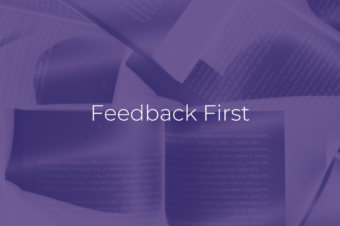
Organisations are embracing cultures that foster greater collaboration and communication – the idea is to create a climate where performance feedback isn’t given once a year, it’s an ongoing process of communication which managers use to engage and motivate their employees for the benefit the bottom line. Self-aware professionals know that seeking feedback is an essential component of effective learning. It’s key to how we improve our performance – constantly thinking about how we are doing and questioning ourselves as to how we can improve.
Feedback is about telling people what we think of their performance and how they should do it better but a recent Harvard Business Review article, The Feedback Fallacy, by Marcus Buckingham and Ashley Goodall suggests that this is not the best way to help people excel and can hinder development. Their research shows:
- we aren’t the reliable raters of other people’s performance that we think we are;
- criticism inhibits the brain’s ability to learn;
- excellence is idiosyncratic, can’t be defined in advance, and isn’t the opposite of failure.
In short, managers can’t “correct” a person’s way to excellence. What is important is to help your team members see what’s working, and sharing your experience of what the person does well.
Truth and experience
Team members may ask you to tell them where they stand, objectively but all you can do is share feelings and experiences, our own reactions. So you can tell someone whether he’s persuasive to us; whether his presentation hits the mark with us. This is because the only area of life in which any of us are an unimpeachable source of truth is that of our own feelings and experiences. We don’t know the truth about our colleagues, at least not in any objective way.
Further it seems that learning is less a function of adding something that may be missing but more a case of improving on what you have by recognising, reinforcing, and refining what already is. Focusing people on their shortcomings or gaps doesn’t enable learning. It impairs it. People learn most when someone pays attention to what’s working for them and helps them to cultivate it intelligently.
How to give people constructive feedback has long been a standard on HR and management training programmes. The arguments in favour of candour and transparency and our ability to face criticism are not new, however, such feedback is good only for correcting mistakes.
What really works?
The authors cite legendary Dallas Cowboys coach Tom Landry who turned around his struggling team by concentrating on looking at what each player had done something easily, naturally, and effectively. Landry thought that while the number of wrong ways to do something was infinite, the number of right ways, for any particular player, was knowable; therefore he looked at plays where that person had achieved excellence. Landry was interested in learning and believed his players would improve performance most when they could see, and analyse, their own personal version of excellence.
It’s quite simple, the informal and invaluable feedback of telling people what went right, “Yes! That!” can make a world of difference; and remember that high performance teams celebrate success so take time to acknowledge and praise people for their good work and focus on achievements and progress.
We don’t do so well when someone whose intentions are unclear tells us where we stand, how good we “really” are, and how to fix ourselves. We excel when people who know us and care about us tell us what they experience and what they feel, and in particular when they see something within us that really works.
image from: https://nypost.com








